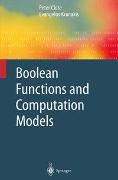Description
Product details
| Authors | Peter Clote, Evangelos Kranakis |
| Publisher | Springer, Berlin |
| Languages | English |
| Product format | Paperback / Softback |
| Released | 21.10.2010 |
| EAN | 9783642082177 |
| ISBN | 978-3-642-08217-7 |
| No. of pages | 602 |
| Dimensions | 156 mm x 32 mm x 234 mm |
| Weight | 926 g |
| Illustrations | XIV, 602 p. |
| Series |
Texts in Theoretical Computer Science. An EATCS Series |
| Subjects |
Natural sciences, medicine, IT, technology
> IT, data processing
> IT
C, Computerprogrammierung und Softwareentwicklung, mathematische Grundlagen, Mathematik: Logik, computer science, Theory of Computation, Programming Techniques, Computer programming, Architecture, Computer, Computer System Implementation, Computers, Mathematical theory of computation, Computer programming / software engineering, Mathematical logic, Mathematical Logic and Foundations, Mathematical foundations, Mathematical Logic and Formal Languages, Computation by Abstract Devices |
Customer reviews
No reviews have been written for this item yet. Write the first review and be helpful to other users when they decide on a purchase.
Write a review
Thumbs up or thumbs down? Write your own review.

